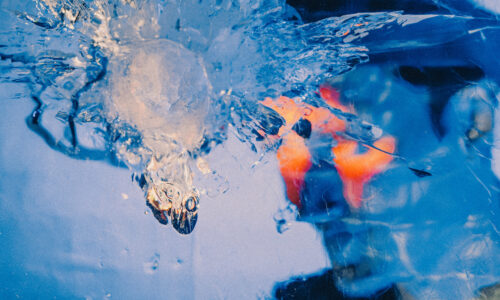5 May 2023
From the early encounters in a freezing cold warehouse in Glasgow, it was clear that Jonathan Morton and Erland Cooper had only just begun to pull on the threads of sound that would eventually develop into Folded Landscapes. Join us for a deep dive into Erland’s discography, the history of our collaboration and the recording of Folded Landscapes.

Who, what, where, and why?
Erland Cooper’s catalogue of work crosses genre boundaries of classical, electronic, and ambient music. He is originally from Stromness in Orkney, and was a founding member of The Magnetic North, with Hannah Peel and Simon Tong, creating atmospheric and ambient post-rock. Their first album Orkney: Symphony of the Magnetic North drew its inspiration from Cooper’s Scottish home, and presents a sonic journey around the islands with each track drawing inspirations “from the bare open horizons, low-lysing islands and sea of Orkney, creating a unique bleak and windswept aesthetic” (The Quietus)
Erland’s work in the contemporary classical and ambient genres have made him one of the country’s most interesting compositional voices. Collaborating with him presented an exciting opportunity for us to explore new genres. Erland and our Artistic Director, Jonathan Morton, came together to explore the connections, contrasts, and conflicts between their creative practices, quickly finding that their approaches to creating and performing music were perfectly aligned. From what originally started as an idea of a piece for string quartet, ideas bubbled and ambitions grew, finally leading us to the creation of Folded Landscapes – a full collaborative album for strings, with electronics, piano, harpsichord, soprano, poetry, and field recordings.
There’s a power in collaboration, through the spontaneity of it. The sparks of creativity fly, and it is always a lovely magnetic feeling – which was palpable in my sessions with Scottish Ensemble.
The recording process
It was an unlikely factory floor that became the stomping ground of experimentation as Erland assessed what strings would do under the pressure of a cold February day. The idea was to challenge the players in the creation of raw moments of sound and to experiment with compositional elements such as re-creating the sound of rewinding tapes and pushing the strings to their limits through pressure, repetition and time. These extracts of audio became the samples that Erland drew upon for the composition of the opening movements of the album. Later, recorded at East Lothian’s Castlesound Recording studios, the piece begins with sparse and icy glacier sounds, developing to a rich, warm and distorted final movement showing the full range of Cooper’s vision of a melting world.
The final movement of the album was recorded onto tape and exposed to the mid-day sun on the hottest day on record on the roof of Erland’s studio in London. Erland offered up his compositions to the forces of nature. The sunlight, heat, and humidity worked their way into the tape, distorting the audio and presenting a sound of solar decay – an example of how our recorded words, sounds, music and art, could all be changed for future generations by the effects of our changing earth. Erland incorporates this decay into his composition, interpreting and contextualising the sonic artefacts that remain: the sounds of these distorted tapes are embedded into the final movements of the album, as the music thaws from its frozen opening to its fiery final acts.
For the first movements, recorded in sub-zero temperatures, there was such a fantastically bright and sharp effect on the sound from Scottish Ensemble’s musicians. The opening really feels cold and almost baroque.
The album and climate change
You might note that temperature, freezing or otherwise, feature heavily on Folded Landscapes, and this is no coincidence, as all the compositions and recordings began in response to the climate crisis. The album thaws over its seven movements, starting in the frigid cold and progressing through rising temperatures and tensions to a final searing heat. Erland describes the final movement as “a sort of classical cèilidh, a dance to the end or perhaps beginning of new days”. Through these experimental techniques, it could be suggested that the natural world is not just an inspiration for the album but is an active participant, a collaborator, in the recording process. This led Cooper to credit ‘the earth’ as a songwriter on the album. This credit is part of a campaign by Earth Percent, a charity started by Brian Eno promoting climate-conscious practices in the music industry, in which musicians and composers credit the planet on their albums and commit a portion of the royalties to support climate change activism.
In just a few short weeks, the album will premiere to four sold-out audiences at London’s Barbican Centre. Cooper’s swooping will melodies signal a message of hope to those listening, that under pressure comes collaboration, and a way forward. It is fitting that the Scottish premieres of Folded Landscapes will be performed in hand with a selection of contemporary classical compositions, curated by Jonathan Morton, highlighting the spirit of this collaboration with each work acting as an exploration of the natural world in musical form. The tour concludes in yet another warehouse, this time bolstered by the unique BODYHEAT technology of Glasgow’s SWG3, which channels the body heat of dancing audience members deep into the earth, both providing air conditioning and forming a geothermal battery to supply heat to the venue – in a remarkable feat of sustainable technology.
Facts and figures can create action, but can also go over people’s heads sometimes, and not lead to the changes we hope for. But storytelling has the ability to make people feel, and I think that art and music, therefore, are powerful catalysts for making change happen.
